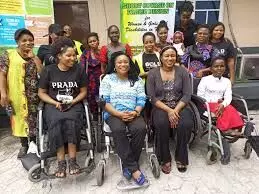
In Nigeria, over 35 million people live with disabilities; a population larger than many African countries.
In spite of their high presence, Persons with Disabilities (PWDs) face systemic barriers to accessing essential services, education, employment, and social inclusion.
While some progress has been made, experts agree that much remains to be done to protect their rights and ensure full inclusion in society.
Although Nigeria ratified the UN Convention on the Rights of Persons with Disabilities (CRPD) in 2007, its principles have not been effectively implemented.
The 2019 Disability Act was a step forward in promoting equality and protecting the rights of PWDs, but its enforcement remains poor due to underfunding, limited awareness, and lack of political will.
This has resulted in widespread marginalisation.
For instance, only 2 per cent of public buildings in Nigeria are wheelchair-friendly, according to a 2023 report by the National Commission for Persons with Disabilities (NCPD).
Moreover, 70 per cent of children with disabilities are out of school, primarily due to inaccessible facilities and discriminatory attitudes, according to UNICEF.
Employment statistics are equally concerning, with PWDs making up less than 5 per cent of the formal workforce, often due to workplace discrimination and a lack of necessary accommodations.
One of the most pressing challenges is access to healthcare.
A lack of disability-friendly infrastructure and resources means that many PWDs cannot receive adequate medical care.
Deaf individuals also face hospital communication barriers, while wheelchair users lack accessible parking near medical facilities.
Disability Rights’ Advocates say the marginalisation of PWDs is not just a social issue; it is an economic one.
The International Labour Organisation (ILO), estimates that excluding PWDs from the workforce costs developing countries like Nigeria 3 to 7 per cent of GDP annually.
The UN body says failure to include PWDs limits their ability to contribute to the economy, perpetuating cycles of poverty and dependence.
For people like Ruth Igbadoo, a 35-year-old Lagos resident living with a chronic eye condition, these barriers are all too real.
Ruth experienced years of limited access to healthcare and social support, which severely impacted her ability to work and care for herself.
“I have been suffering from vision problems for years. The hospital visits were expensive, and the options I had were limited. There was no real support for someone like me,” Ruth explained.
Her story took a positive turn when she attended a health fair organised by Mercy Corps’ Girls Improving Resilience Through Livelihood and Health (GIRL-H) 2.0 programme.
The programme provided Ruth with the necessary eye care to restore her vision, allowing her to regain her confidence and livelihood.
“I can now work with my vision restored, and I’m more confident. I feel empowered to take care of myself and my family,” she said.
Ruth’s experience reflects the need for more inclusive healthcare systems and serves as a reminder of the transformative power of targeted interventions.
In contrast, many advanced countries have successfully embraced disability inclusion, demonstrating its social and economic benefits.
Countries like Canada and Germany have implemented inclusive employment policies, such as tax incentives for companies that hire PWDs and workplace accommodations.
A 2021 Organisation for Economic Co-operation and Development report shows that such measures have boosted PWD employment by 15 per cent over the past decade, driving GDP growth.
In the US, the Americans with Disabilities Act (ADA) mandates accessible public buildings and transport systems.
This has not only improved the quality of life for PWDs but has also boosted tourism and commerce.
For example, accessible infrastructure attracts more tourists and customers, expanding market opportunities.
Inclusive education policies in Finland and Sweden ensure that children with disabilities receive quality education alongside their peers.
This has resulted in higher literacy and employment rates for PWDs, as well as innovations in assistive technology that benefit the society at large.
Countries like the UK and New Zealand have established robust welfare systems that provide financial support, healthcare, and housing for PWDs.
These measures not only improve social equity but also reduce dependency on families, enabling PWDs to live independently.
Experts say disability inclusion benefits society by fostering social cohesion, driving innovation, and promoting equity.
Countries with strong disability rights’ frameworks gain global recognition and attract international partnerships, while inclusive designs improve accessibility for all.
Recognising the need for change, the Advocacy for Women with Disabilities Initiative (AWWDI) recently urged the Nigerian government to enforce laws and tackle challenges facing women and girls with disabilities.
“We need inclusive laws because existing ones have barriers,” said Monsurat Fasasi, AWWDI’s FCT Coordinator.
She cited examples such as the absence of sign language interpreters in hospitals and the mistreatment of women with disabilities during labour.
Similarly, Ms Juliet Orji, a member of the Blind Association in the FCT, called for accessible public buildings and inclusive policies that address the needs of all disability communities.
Dr Ayuba Gufwan, Executive Secretary of the NCPD, advocates for a multi-sectoral approach to disability inclusion.
“Every year, more people join the community of persons with disabilities due to accidents, aging, or health conditions.
“We need to make Nigeria adaptable for all, ensuring that everyone has access to opportunities and quality life,” he said.
All in all, stakeholders believe that the fight for the rights of PWDs is not just about healthcare access; but creating a society where everyone, regardless of ability, can thrive.
They opined that as Nigeria strives for progress, it must draw inspiration from successful examples of other countries and prioritise disability inclusion in its policies and practices.
Writter: Abiemwemse Moru



